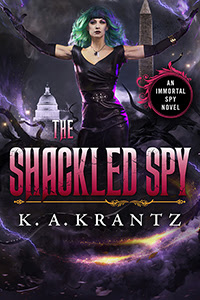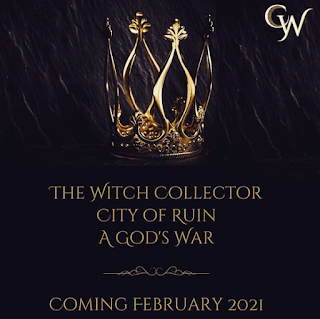Our topic at the SFF Seven this week is Promo for BIPOC Artists, Authors, and other Creatives.
I always hesitate to pick one person to talk up, or even a few, because there are so many wonderful BIPOC creators out there. So, instead of feeding you a fish, I'm going to show you a river full of fish. (I assume you know how to fish!) Keep in mind this is one river among many, but it's a good one. And I'm particularly proud because SFWA had a small part in helping this happen. (As in, we handed over money and these amazing people did all the heavy lifting.)
In fall of 2020, the first every FIYAHCON happened. It's a conference for BIPOC in speculative fiction. They deftly proved that not only can BIPOC creatives be found to staff conference panels, they made an entire convention of these sparklingly creative people.
And they inaugurated the IGNYTE Awards. The Awards seek to celebrate the vibrancy and diversity of the current and future landscapes of science fiction, fantasy, and horror by recognizing incredible feats in storytelling and outstanding efforts toward inclusivity of the genre. I encourage you to check out all the nominees in this wide array of media. Follow the link for more information, but here's the list below. Go forth and feast!
Best Novel – Adult
for novel-length (40k+ words) works intended for the adult audience
The Dragon Republic – R.F. Kuang (Harper Voyager)
WINNER | Gods of Jade and Shadow – Silvia Moreno-Garcia (Del Rey)
Jade War – Fonda Lee (Orbit)
Storm of Locusts – Rebecca Roanhorse (Saga Press)
Kingdom of Copper – S. A. Chakraborty (Harper Voyager)
Best Novel – YA
for novel-length (40k+ words) works intended for the young adult audience
Pet – Akwaeke Emezi (Make Me a World/PRH Children’s Books)
Everlasting Rose – Dhonielle Clayton (Freeform)
Slay – Brittney Morris (Simon Pulse)
War Girls – Tochi Onyebuchi (Razorbill)
WINNER | We Hunt the Flame – Hafsah Faizal (FSG BYR)*
*BYR: “Books for Young Readers”
Best in MG
for works intended for the middle grade audience
WINNER | Tristan Strong Punches a Hole in the Sky – Kwame Mbalia (Disney Hyperion)
Just South of Home – Karen Strong (S&S BYR)*
The Mystwick School of Musicraft – Jessica Khoury (Audible/HMH BYR)* **
Other Words for Home – Jasmine Warga (HarperCollins)
Sal and Gabi Break the Universe – Carlos Hernandez (Disney Hyperion)
*BYR: “Books for Young Readers”
** audiobook released in 2019
Best Novella
for speculative works ranging from 17,500-39,999 words
The Deep – Rivers Solomon, Daveed Diggs, William Hutson, and Jonathan Snipes (Gallery/Saga Press)
The Survival of Molly Southbourne – Tade Thompson (Tor/Forge (Tor.com))
The Gurkha and the Lord of Tuesday – Saad Z. Hossain (Tor/Forge (Tor.com))
WINNER | This is How You Lose the Time War – Max Gladstone & Amal El-Mohtar (Gallery/Saga Press)
The Haunting of Tram Car 015 – P. Djèlí Clark (Tor/Forge (Tor.com))
Best Novelette
for speculative works ranging from 7,500-17,499 words
WINNER | Emergency Skin – N K Jemisin for the Amazon Forward Collection
While Dragons Claim the Sky – Jen Brown for FIYAH Literary Magazine
Circus Girl, The Hunter, and Mirror Boy – JY Neon Yang for Tor.com
The Archronology of Love – Caroline M. Yoachim for Lightspeed
Omphalos – Ted Chiang for Exhalation: Stories
Best Short Story
for speculative works ranging from 2,000-7,499 words
Ten Excerpts from an Annotated Bibliography on the Cannibal Women of Ratnabar Island – Nibedita Sen for Nightmare Magazine
Dune Song – Suyi Davies Okungbowa for Apex Magazine
And Now His Lordship is Laughing – Shiv Ramdas for Strange Horizons
Canst Thou Draw Out the Leviathan – Christopher Caldwell for Uncanny Magazine
WINNER | A Brief Lesson in Native American Astronomy – Rebecca Roanhorse for Mythic Dream
Best in Speculative Poetry
Heaven is Expensive – Ruben Reyes, Jr. for Strange Horizons
Elegy for the Self as Villeneuve’s Beast – Brandon O’Brien for Uncanny Magazine
Those Who Tell the Stories – Davian Aw for Strange Horizons
goddess in forced repose – Tamara Jerée for Uncanny Magazine
Critics Award
for reviews and analysis of the field of speculative literature
Charles Payseur – Quick Sip Reviews
WINNER | Alex Brown – Tor.com
Best Fiction Podcast
for excellence in audio performance and production for speculative fiction
PodCastle – Editors Jen R. Albert, Cherae Clark, Khaalidah Muhammad-Ali, Host + Assistant Editor Setsu Uzume, & Audio Producer Peter Adrian Behravesh
Nightlight Podcast – Tonia Ransom
WINNER | LeVar Burton Reads – LeVar Burton, Julia Smith, Adam Deibert, Brendan Byrnes, Mischa Stanton, Kristen Torres, Jenny Radelet, Josephine Martorana, Chris Bannon
Beneath Ceaseless Skies – Editor Scott H. Andrews
Obsidian Podcast – Co-Creators, Producers, and Writers Adetola Abdulkadir & Safiyah Cheatam
Best Artist
for contributions in visual speculative storytelling
WINNER | Grace P. Fong
Best Comics Team
for comics, graphic novels, and sequential storytelling
WINNER | These Savage Shores – Ram V, Sumit Kumar, Vitorio Astone, Aditya Bidikar, & Tim Daniel
Blackbird Vol. 1 – Sam Humphries, Jen Bartel, & Triona Farrell
Excellence – Khary Randolph, Brandon Thomas, Emilio Lopez, & Deron Bennett
Coda – Simon Spurrier, Matías Bergara, Michael Doig, Jim Campbell, & Colin Bell
Bitter Root – David F Walker, Chuck Brown, & Sanford Greene
Best Anthology/Collected Works
The Mythic Dream – Editors Dominik Parisien & Navah Wolfe
Broken Stars: Contemporary Chinese Fiction in Translation – Editor, Translator Ken Liu
WINNER | New Suns: Original Speculative Fiction by People of Color – Editor Nisi Shawl
This Place: 150 Years Retold – Kateri Akiwenzie-Damm, Sonny Assu, Brandon Mitchell, Rachel and Sean Qitsualik-Tinsley, David A. Robertson, Niigaanwewidam James Sinclair, Jen Storm, Richard Van Camp, Katherena Vermette, Chelsea Vowel | illustrated by Tara Audibert, Kyle Charles, GMB Chomichuk, Natasha Donovan, Scott B. Henderson, Ryan Howe, Andrew Lodwick, Jen Storm | colour by Scott A. Ford, Donovan Yaciuk
A People’s Future of the United States – Victor LaValle & John Joseph Adams
Best in Creative Nonfiction
for works related to the field of speculative fiction
AfroSurrealism: The African Diaspora’s Surrealist Fiction – Rochelle Spencer (Routledge)
The Dark Fantastic – Ebony Elizabeth Thomas (NYU Press)
WINNER | Black Horror Rising – Tananarive Due (Uncanny Magazine)
Our Opinions are Correct – Charlie Jane Anders & Annalee Newitz
Tongue-Tied: A Catalog of Losses – Layla Al-Bedawi (Fireside Fiction)
The Ember Award
for unsung contributions to genre
Tananarive Due
WINNER | LeVar Burton
Keidra Chaney
Nisi Shawl
Malon Edwards
The Community Award
for Outstanding Efforts in Service of Inclusion and Equitable Practice in Genre
Beth Phelan
Mary Robinette Kowal
Diana M. Pho
Writing The Other – Nisi Shawl + K Tempest Bradford
WINNER | Strange Horizons – Gautam Bhatia, Vajra Chandrasekera, Joyce Chng, Kate Cowan, Tahlia Day, William Ellwood, Rebecca Evans, Ciro Faienza, Lila Garrott, Dan Hartland, Amanda Jean, Lulu Kadhim, Maureen Kincaid Speller, Catherine Krahe, Anaea Lay, Dante Luiz, Heather McDougal, AJ Odasso, Vanessa Rose Phin, Clark Seanor, Romie Stott, Aishwarya Subramanian, Fred G. Yost, and the SH copyediting team and first readers





























